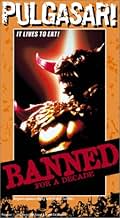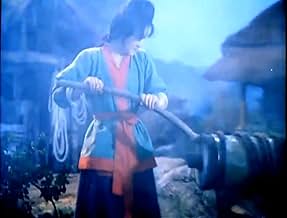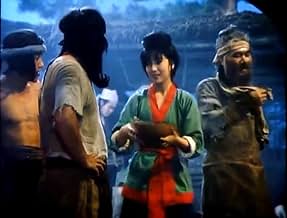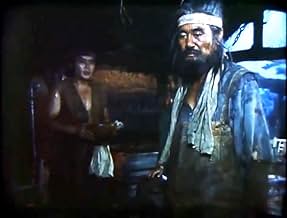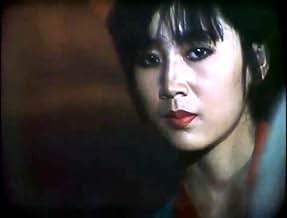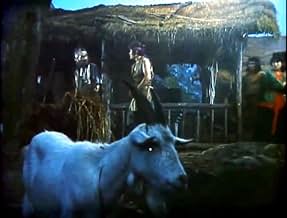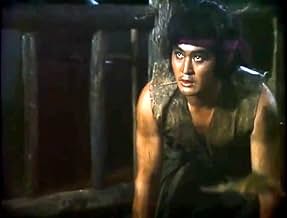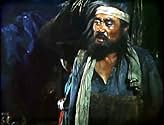Pulgasari
- 1985
- 1h 35m
IMDb RATING
5.2/10
1.4K
YOUR RATING
In feudal Korea, a group of starving villagers grow weary of the orders handed down to them by their controlling king and set out to use a deadly monster under their control to push his armi... Read allIn feudal Korea, a group of starving villagers grow weary of the orders handed down to them by their controlling king and set out to use a deadly monster under their control to push his armies back.In feudal Korea, a group of starving villagers grow weary of the orders handed down to them by their controlling king and set out to use a deadly monster under their control to push his armies back.
- Director
- Writer
- All cast & crew
- Production, box office & more at IMDbPro
Featured reviews
I like to watch Kaiju films and this Korean monster movie it's a funny monster movie with great battle scenes. In the beginning I supposed that will be other bad movie, but after some scenes you'll be invited to appreciate the story about poor villain people that fight against a bad king and his cruelty governor. Besides the poor special effects, most of them inside the atmosphere behind the Pulgarasi monster, other great battle scenes with hundred extras acting and fighting, You'll like all the crew efforth to create power and big scenes. This movie was produced by Jong-il Kim and directed by Sang-OK Shin. This is the first movie that I watch directed by Sang-OK Shin, but I felt interested in watch other movies directed by him.
In the days of feudal Asia, the crops are not so good, and farmers are facing a takeover by Jong-Un Kim ... oops the self-proclaimed king (Yong-hok Pak.)
The farm Jugend becomes rebels and with the help of the local blacksmith physically challenges the king.
The king offers the blacksmith employment by supplying his army with weapons. Naturally, the blacksmith refuses. While he is imprisoned his last dying, wish is to make a revengeful "iron eating" Pulgasari.
Eventually, the king may meet the same fate as Bambi Meets Godzilla .
The big question is will any of the good guys survive?
Or will the world go to the peasants?
The film was loosely based on the legend of the Bulgasari.
The value in the movie is not the movie it is self but the historical value.
On the orders of Kim Jong-il, the South Korean film director Shin Sang-ok (1926-2006) and his wife, famous actor Choi Eun-hee, was kidnapped to North Korea.
After three years in prison, Shin was united with Choi, and the two were instructed by Kim Jong-Il to make films for him to gain global recognition in the film industry. After making various films for Kim Jong-Il, including Pulgasari in 1985, in 1986 Choi and Shin escaped from North Korean caretakers to a US embassy while in Vienna.
The Lovers and The Despot.
The farm Jugend becomes rebels and with the help of the local blacksmith physically challenges the king.
The king offers the blacksmith employment by supplying his army with weapons. Naturally, the blacksmith refuses. While he is imprisoned his last dying, wish is to make a revengeful "iron eating" Pulgasari.
Eventually, the king may meet the same fate as Bambi Meets Godzilla .
The big question is will any of the good guys survive?
Or will the world go to the peasants?
The film was loosely based on the legend of the Bulgasari.
The value in the movie is not the movie it is self but the historical value.
On the orders of Kim Jong-il, the South Korean film director Shin Sang-ok (1926-2006) and his wife, famous actor Choi Eun-hee, was kidnapped to North Korea.
After three years in prison, Shin was united with Choi, and the two were instructed by Kim Jong-Il to make films for him to gain global recognition in the film industry. After making various films for Kim Jong-Il, including Pulgasari in 1985, in 1986 Choi and Shin escaped from North Korean caretakers to a US embassy while in Vienna.
The Lovers and The Despot.
As the workers have a hard time rebelling against the oppressive (pre colonized) Chosen regime they get unexpected help from the gods. Bulgasari awakens to life from a figure of clay and rice with the drop of blood from Ami and is thereby under her authority. This secret weapon was exactly what they needed in order to kill the king, but it grows out of control. Whether this monster represents capitalism or not is anyones guess, I didn't notice anything that pointed towards that conclusion in the movie, but there's always the juche discourse to look it in the light of. After all Kim Jong-il is listed as a producer. With that in mind, I got a little bit anxious by the ending.
As a movie it is OK. The script is very simple and the characters are, like the weapons, like cardboard cutouts. Some of the berserker smashing the temples (cultural revolution style?) however, were quite impressive. All the shouting and wailing were not. I wonder if there's a movie were the title of it is repeated more often than in this.
As a movie it is OK. The script is very simple and the characters are, like the weapons, like cardboard cutouts. Some of the berserker smashing the temples (cultural revolution style?) however, were quite impressive. All the shouting and wailing were not. I wonder if there's a movie were the title of it is repeated more often than in this.
first of all, its unfair to compare this movie with a Hollywood product: this is an eastern "man-in-rubber-suit" monster movie made in north Korea and must be evaluated as such. and in his niche this is one of the very best. for the originality and meanings it deserves to be put on the same level of Honda's Godzilla of 1954. it sports believable effects, real mass scenes (ok they were soldiers drafted to act in a movie but nevertheless it's better than what i've seen in "Gappa") and believe it or not a plot that is less nonsense than the usual Gamera - Rodan - Godzilla - Gappa stuff we got used to. at least all the story is more fantastic than Sci-Fi and this places everything on a completely different perspective. "comedy" episodes are laughable but i suppose that asking to a North-Korean movie to meet the standard humor tastes of a western audience is way too much. the interpretative key of the story revolves around the goods and evils of capitalism ,one may appreciate or not the intentions but go find another Kaiju with more sense than "the Japanese are still scared after the atom bomb, poor souls", and "the Japanese scientists save the world". Pulgasari is finally less nationalistic than the average Japanese movie, and this is outstanding for a product of a dictatorial country, isn't ?
The backstory to this movie is pretty darn incredible - made in North Korea by the country's dictator - the director and two lead performers were actually kidnapped from S. Korea after they refused to work on this movie with the dictator. Seriously - not kidding. As for the movie itself - it is pretty good in many ways. The story itself works as an old village myth - an iron eating monster comes to life to save poor farmers and villagers from a cruel warlord. The effects are cheesy and silly but some of the battle sequences are impressive for no other reasons then you can tell there are literally thousands of people fighting in these scenes. After all the CGI effects of recent time - it was refreshing and stunning to see so many actual people being used in a big battle. Then again, they probably didn't have much choice. I guess if the dictator of a country tells you to be in his movie, you are in the movie!!
Did you know
- TriviaAlthough the film is a North Korean production, director Shin Sang-ok is South Korean. North Korean dictator Jong-Il Kim was a huge fan of Shin's. At the time this film was made, North and South Korea were at war (which eventually ended in 2018 thanks to the Panmunjom Declaration). Thus, Kim had him kidnapped. Shin eventually escaped back to South Korea, but not before he had been forced to make this movie for the erratic North Korean leader.
- ConnectionsFeatured in Great Man and Cinema (2009)
- How long is Pulgasari?Powered by Alexa
Details
Contribute to this page
Suggest an edit or add missing content


